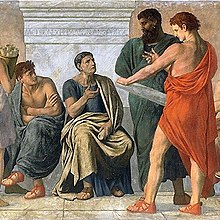Callisthenes
Callisthenes of Olynthus (Greek: Καλλισθένης; ca. 360 BC-328 BC) was a Greek historian, nephew of Aristotle and disciple yours in Aso.
Biography
Calisthenes traveled with his uncle to the Macedonian court at Pella, following Philip II's request of Aristotle to be the tutor of his son Alexander. There Callisthenes gradually adopted the Panhellenic ideal advocated by the Macedonian king, based on the hegemony of Macedonia in Hellas to overcome the threat posed by the Achaemenid Empire.
After Philip's assassination, Callisthenes was recommended by Aristotle to be Alexander's personal historian during his planned campaign against the Persian Empire. Callisthenes praised Alexander's exploits in his narratives, picking up the Macedonian king's claim to be the son of Zeus.
Along with the chronicle of Alexander's expedition, Callisthenes also wrote several other works, such as the Hellenics, the history of Greece from the Peace of Antalcidas to the beginning of the Phocaean War (387 -357 BC), as well as the List of the winners of the Pythian Games together with his uncle Aristotle.
A large amount of legendary material was collected in ten volumes called Romance of Alexander, being the basis of all the legends about him in the Middle Ages. The final form of this text belongs to the III century, its author is generally known as the Pseudo Callisthenes, although the translation into Latin, made by Julius Valerius Alexander Polemius (early IV century) is attributed to an Aesop. Other characters to whom its authorship is attributed are Aristotle, Antisthenes of Athens, Onesícrates and Flavio Arriano.
Alongside the Latin text, several versions were made in Armenian, Slavonian, Syriac, and four in Greek in the Middle Ages; Valerio's translation was eventually replaced by the one made by Leo, Archbishop of Naples, in the X century, the so-called History of Preliis.
Calisthenes was one of Alexander's critics from the moment the Macedonian king decided to assume the Persian ceremonial, with practices such as the proskynesis of his subjects before him. This oriental custom consisted of kneeling and touching the ground with the forehead in this position before the king, as a sign of devotion to the sovereign for his divine nature. This practice assumed by Alexander was badly received by the Macedonians and the Greeks of his army and his bureaucracy, among which was Callisthenes, who on one occasion offended the king by not prostrating himself before him. This meant the historian's fall from grace before Alexander, who later stopped the so-called "conspiracy of the pages", accusing Callisthenes of being behind it. Callisthenes was arrested and imprisoned, since due to his Hellene status he could not be prosecuted by a Macedonian court.
One of the Macedonian king's generals, Lysimachus, who was the same age as the disgraced friend, visited him every day. Faced with these signs of friendship, the philosopher told him: 'It is not convenient that you come to see me so often, because you can attract the wrath of Alexander on yourself'; to which he replied: 'I will not stop coming to see you every afternoon, because if they see that virtuous people stop taking an interest in your luck, everyone will believe that you are guilty' .
In the end he died during his captivity, either due to torture or starvation. The sad end of Callisthenes was commemorated by his friend Theophrastus in a unique treatise: Callisthenes or A Treatise on Pain , which he released during a visit to Athens..
Quotes
- Plutarco: Parallel lives, Alejandro52-55.
- Flavio Arriano: Anabasis, IV, 10-14.
- Suidas s.v.
- Diogenes Laercio: Lives, opinions and sentences of the most illustrious philosophersV, Aristotle.
- Fifth Curt: History of Alexander the Great of Macedonia, VIII, 5-8.
Contenido relacionado
Hatshepsut
Zapatista
Rebel without a cause

